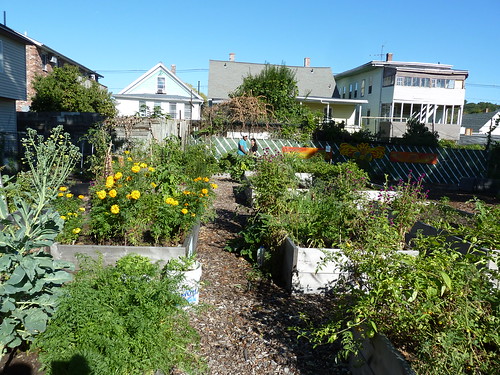“Build-A-Garden” with Mill City Grows

Here’s some news from Mill City Grows
“Build-A-Garden” Program Brings Five New Vegetable Gardens to Lowell
Lowell Housing Authority, Stoklosa School, Robinson School, Pawtucket Congregational Church, and UTEC to install garden beds in April
Lowell, MA – January 3rd 2014. Mill City Grows, an initiative that fosters food justice by creating, urban food production, food access, and food education in Lowell, has just announced its 2014 “Build-A-Garden” partner organizations. This spring, the Lowell Housing Authority at North Common Village, the Stoklosa School, the Robinson & McAuliffe Schools, the Pawtucket Congregational Church, and the United Teen Equality Center, Inc (UTEC) will install raised-bed vegetable gardens for production by residents, students, and community members.
The “Build-A-Garden” program is the newest among Mill City Grows’ varied approaches to increasing wellness and community resilience in Lowell through the creation of fresh food production sites and fresh food access points. With funding from a Community Development Block Grant, Mill City Grows will create custom designs for raised-bed vegetable gardens at each site, as well as the materials to construct up to five raised garden beds. In addition, Mill City Grows staff will work with each organization to recruit volunteers to build each site and will also offer an on-site training workshop to gardeners and technical assistance throughout the first season.
The new “Build-A-Garden” projects are expected to have far-reaching effects. “Installing gardens at organizations’ sites will not only change the physical space, they will also change community mentality, environmental health, and low-income residents’ access to healthy forms of food and activities,” explained Francey Slater, Co-Director of Mill City Grows.
Ruth Richards, the pastor of Pawtucket Congregational Church on Mammoth Road, looks forward to engaging the church and surrounding community in the new garden. “We are a very small congregation, so a community garden is something we could not do on our own, but Mill City Grows offers training and expertise and lots of resources, which makes it possible for us to share what we have with others.”
At North Common Village, Michelle Richter, the Director of Family Self-Sufficiency, sees much potential in the creation of a small garden on Lowell Housing Authority property. “The establishment of a community garden within our North Common Village Housing Development will provide a valuable, hands-on learning tool as well as the provision of fresh, local produce for our residents. We look forward to involving our Learning Zone After-School Program, Summer Youth Activities Program and NCV residents in both the care and harvest of the garden.” Volunteers from the Merrimack Valley Food Bank will support the garden at NCV, and make sure produce gets distributed to households in need.
Mill City Grows has designed this program to be self-sustaining. “‘Build-A-Garden’ is truly a partnership between Mill City Grows and these community organizations,” explained Ms. Slater. “Our goal is for the gardens to be maintained by volunteers of the organizations themselves, which is why a leader from each organization will also be provided with in-depth training at the Garden Coordinator Institute this winter.”
Mill City Grows’ Garden Coordinator Institute (GCI) is a 6-session leadership program that will prepare the “Build-A-Garden” partners, as well as community gardeners from across the city, to maintain their new gardens. Participants will learn techniques for growing organic produce in urban spaces, and will practice community leadership skills to build strong participation of gardeners in the upkeep and development of the gardens.
By the end of April, Lowellians will enjoy five new green spaces around the city, and lots of organic vegetables. “We are excited to support these five organizations as they pollinate the city with safe spaces to grow food and build healthy communities,” said Ms. Slater.
For more information please visit www.millcitygrows.org or email info@millcitygrows.org